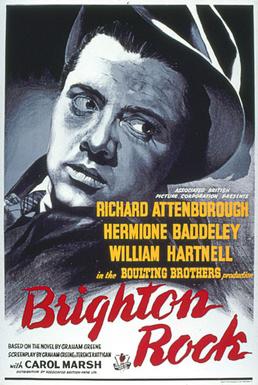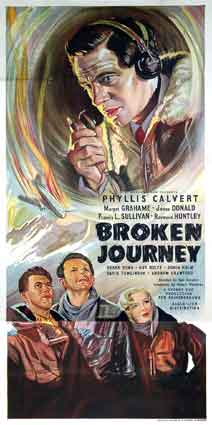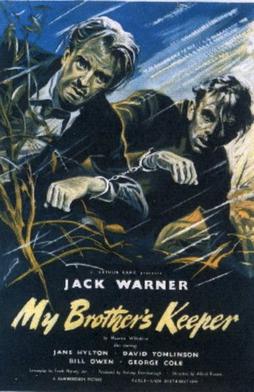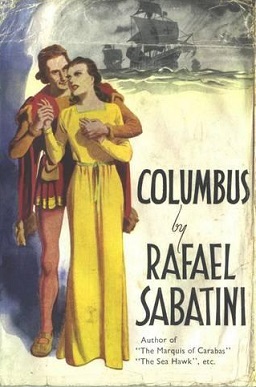Frank Sydney Box was a British film producer and screenwriter, and brother of British film producer Betty Box. In 1940, he founded the documentary film company Verity Films with Jay Lewis.

Easy Money is a 1948 British satirical film directed by Bernard Knowles and starring Greta Gynt, Dennis Price and Jack Warner. It was written by Muriel and Sydney Box, based on the 1948 play of the same title by Arnold Ridley. It was released by Gainsborough Pictures.

Brighton Rock is a 1948 British gangster film noir directed by John Boulting and starring Richard Attenborough as violent gang leader Pinkie Brown, Rose Brown as the innocent girl he marries, and Ida Arnold as an amateur sleuth investigating a murder he committed.

Christopher Columbus is a 1949 British biographical film starring Fredric March as Christopher Columbus and Florence Eldridge as Queen Isabella. It is loosely based on the 1941 novel Columbus by Rafael Sabatini with much of the screenplay rewritten by Sydney and Muriel Box.

Jassy is a 1947 British colour film historical melodrama directed by Bernard Knowles and starring Margaret Lockwood, Patricia Roc and Dennis Price. It was written by Dorothy Christie, Campbell Christie and Geoffrey Kerr based on the 1944 novel by Norah Lofts. Set in the early 19th century, it is a Gainsborough melodrama, the only one to be made in Technicolor, and was the last "official" Gainsborough melodrama.
The Gainsborough melodramas were a sequence of films produced by the British film studio Gainsborough Pictures between 1943 and 1947 that conformed to a melodramatic style. The melodramas were not a film series but an unrelated sequence of films that had similar themes that were usually developed by the same film crew and frequently recurring actors who played similar characters in each. They were mostly based on popular books by female novelists and they encompassed costume dramas, such as The Man in Grey (1943) and The Wicked Lady (1945), and modern-dress dramas, such as Love Story (1944) and They Were Sisters (1945). The popularity of the films with audiences peaked mid-1940s when cinema audiences consisted primarily of women. The influence of the films led to other British producers releasing similarly themed works, such as The Seventh Veil (1945), Pink String and Sealing Wax (1945), Hungry Hill (1947), The White Unicorn (1947), Idol of Paris (1948), and The Reluctant Widow (1950) and often with the talent that made Gainsborough melodramas successful.
The Clouded Yellow is a 1950 British mystery film directed by Ralph Thomas and produced by Betty E. Box for Carillon Films. It stars Jean Simmons and Trevor Howard. A dismissed secret service agent falls in love with a disturbed young woman who is wrongly accused of murder and the two go on the run, pursued by the police, the secret service, and the real murderer.

The Long Duel is a 1967 British adventure film directed by Ken Annakin and starring Yul Brynner, Trevor Howard, Charlotte Rampling and Harry Andrews. It is set in British-ruled India of the 1920s but was filmed in Spain.

The Man Within is a 1947 British, Technicolor, adventure, crime, drama film, directed by Bernard Knowles and starring Ronald Shiner as Cockney Harry, Michael Redgrave, Jean Kent, Joan Greenwood and Richard Attenborough. In the United States, it was released in a slightly shorter version, retitled The Smugglers. It was produced by Triton Films and Production Film Service. The film was also presented by J. Arthur Rank and the Rank Organisation. The film was adapted from the 1929 novel The Man Within by Graham Greene.

Broken Journey is a 1948 British drama film directed by Ken Annakin and featuring Phyllis Calvert, James Donald, Margot Grahame, Raymond Huntley and Guy Rolfe. Passengers and crew strugge to survive after their airliner crashes on top of a mountain; based on a true-life accident in the Swiss Alps.

The Bad Lord Byron is a 1949 British historical drama film about the life of Lord Byron. It was directed by David MacDonald and starred Dennis Price as Byron with Mai Zetterling, Linden Travers and Joan Greenwood.

Once Upon a Dream is a 1949 British comedy romance film directed by Ralph Thomas in his debut and starring Googie Withers, Griffith Jones, and Guy Middleton. It was a J. Arthur Rank presentation and a Sydney Box production, and was released through General Film Distributors Ltd. The film was made at the Lime Grove Studios with sets designed by the art director Cedric Dawe.

The Calendar is a black and white 1948 British drama film directed by Arthur Crabtree and starring Greta Gynt, John McCallum, Raymond Lovell and Leslie Dwyer. It is based on the 1929 play The Calendar and subsequent novel by Edgar Wallace. A previous version had been released in 1931.

My Brother's Keeper is a 1948 British crime film in the form of a convicts-on-the-run chase thriller, directed by Alfred Roome for Gainsborough Pictures. It was the first of only two films directed by Roome during a long career as a film editor. The film stars Jack Warner and George Cole and was produced by Sydney Box.

Daybreak is a 1948 drama by Riverside Studios – classified by some as 'British Noir' – directed by Compton Bennett and starring Eric Portman, Ann Todd and Maxwell Reed. It is based on a play by Monckton Hoffe.

The Passionate Stranger is a 1957 British drama film, directed by Muriel Box and starring Margaret Leighton and Ralph Richardson. It uses the film within a film device, with the "real" part of the plot shot in black-and-white and the "fictional" element in colour.

Columbus is a romantic adventure novel by the British writer Rafael Sabatini which was first published in 1941. It depicts the life of Christopher Columbus at the Spanish court, his voyages across the Atlantic Ocean in which he discovered the Americas and his relationship with the mother of his second son Beatriz Enríquez de Arana, whom he never married.

The Forgotten Story is a 1945 historical novel by the British novel Winston Graham. In the late nineteenth century a barquentine crashes on the rocks of the Cornish coast.
London Independent Producers was a British film production company. It was founded in 1951 by Sydney Box and William MacQuitty. Box had recently been head of production of Gainsborough Pictures, part of the Rank Organisation. After Gainsborough was closed down Box left Rank and chose to produce independently. Box's wife, the director Muriel Box, acted as a third partner.
David Stephen Knight was an American film and television actor who worked for many years in Britain. He began his screen career as a contract player for the Rank Organisation who used him as the male lead in several of its productions. He was married in 1963 to the Scottish actress Wendy McClure (1930–2022) and they had two children.














